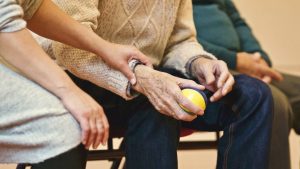We’ve all been there, when feeling sick the highest aim is to get well again, preferably as soon as possible. However, this isn’t something that is within reach for everybody, especially not for people with chronic diseases, like Alzheimer’s, Parkinson’s, or cardiovascular diseases. Due to the progressive development of such conditions, returning to a status quo is unfortunately out of reach.
Therefore, the focus needs to shift to slowing down the progression of a disease and making the best out of the situation in such a way that enables people to be as healthy as possible, and in turn, live the best life possible.
This is in accordance with the concept of Health promotion, which was defined by the World Health Organization (WHO) in 1986 in the first conference of Health Promotion in Ottawa. Thus, health promotion is “the process of enabling people to increase control over, and to improve, their health” (World Health Organization, 1986). Concrete strategies were published afterwards in the Ottawa Charter for Health Promotion and now serve as the foundation for the “Health for All” strategy of the WHO.
One of the basic tenets of health promotion is to enable people “to achieve their fullest health potential,” in other words, to put people in a position where they can control and can stand up for their own health. This way, people are not only passive recipients of health care, rather, they can advocate for themselves and, in a wider sense, make the best out of the situation. Having a “supportive environment, access to information, life skills and opportunities for making healthy choices,” were identified as ways to reach this goal.
Similarly, the concept of empowerment builds on the concept of enabling. According to the WHO, empowerment is “a process through which people gain greater control over decisions and actions affecting their health” (World Health Organization. Division of Health Promotion & Communication, 1998). Conditions should allow people directly to influence their health through actions – individually and as a group.
In the age of digitalisation, more and more technologies are being developed to support people in their daily lives. Ranging from simple communication tools to activity trackers or sophisticated monitoring devices, technology offers a wide spectrum of implementation possibilities. Whereby some tools are developed primarily for enjoyment, as, for example, game applications, while others offer solutions to problems in daily living and aim to increase individual control over actions.
Said solutions are also targeted by the European project “TeNDER” (affecTive basEd iNtegrateD carE for betteR Quality of Life), which is currently running in the EU-funded Horizon 2020 programme. During the project, a technological, sensor-based system is being developed aiming to increase the autonomy of the user and thus also leading to an increased quality of life.
By giving the users possibilities to have control over their daily activities, TeNDER empowers them in various aspects. Therefore, users can manage their medication intake alone or schedule dates (medical or personal) with a Virtual Assistant and a Calendar-Function, which is especially important for users with memory impairment. Furthermore, users can track their activity with respective tools, or monitor their vital signs, like blood pressure or heart rate, and check their quality of sleep.
Moreover, with the linkage of various health sectors and services in the sense of integrated care, the TeNDER system connects patients with their respective physicians and carers. This way, more relevant information can be provided to make planned visits more efficient.
All in all, technology-based systems offer the user the means to lead a more independent and autonomous lifestyle despite the presence of disease, and empower him or her to take action in controlling their own health.
References
World Health Organization. (1986). The Ottawa Charter for Health Promotion. Retrieved from http://www.who.int/healthpromotion/conferences/previous/ottawa/en/index.html
World Health Organization. Division of Health Promotion, E., & Communication. (1998). Health promotion glossary. Geneva: World Health Organization.






